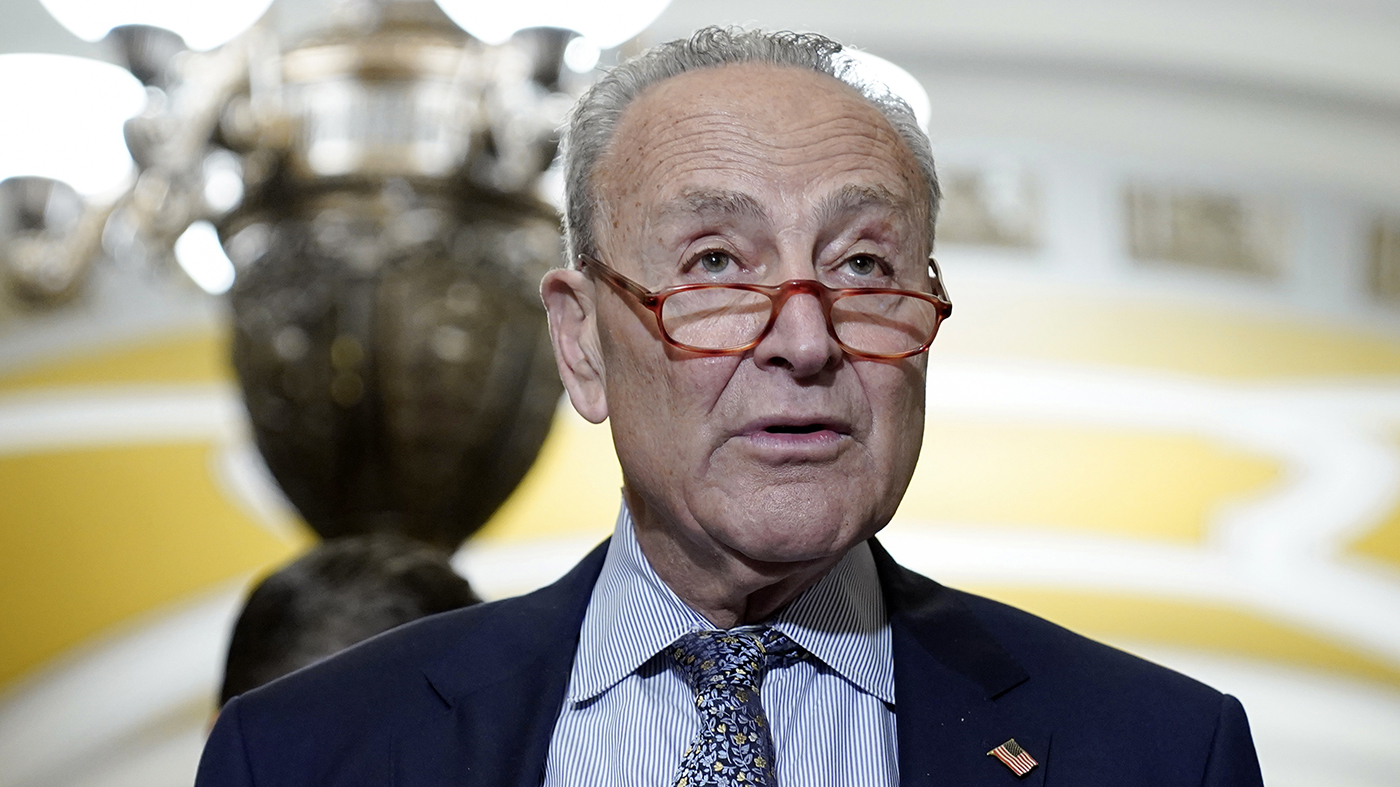The Hill’s Morning Report — Why are Trump’s GOP rivals stuck?

Editor’s note: The Hill’s Morning Report is our daily newsletter that dives deep into Washington’s agenda. To subscribe, click here or fill out the box below.
Former President Trump’s legal woes may prove harmful to his White House bid — or to everyone else’s.
It’s difficult for GOP primary rivals to beat him if they are joining him, at least in responses to media questions about whether Trump can or should serve as president if convicted of various alleged felonies. Primary candidates find themselves talking as much or more about Trump and his role in trying to overturn the 2020 election, as their own presidential plans.
“Nobody else can get any traction or attention because all we’re talking about is Donald Trump’s legal troubles,” former Maryland GOP Gov. Larry Hogan, a Trump critic who decided against a White House bid, said during an MSNBC interview broadcast on Sunday.
“There are about half of the people in the Republican primary who do not want Donald Trump. They just can’t decide on which of the other 11 candidates they want to support because they aren’t — they aren’t getting much oxygen or airtime,” Hogan added (The Hill).
Trump’s campaign for the White House is becoming an unprecedented race for his freedom, reports The Hill’s Brett Samuels. The former president is navigating criminal indictments in Manhattan and South Florida, as well as potential indictments in Washington, D.C. and Georgia. Winning the presidential race next year could insulate Trump from conviction or jail time. He could pardon himself, shut down a Department of Justice prosecution and challenge or stall state or local indictments — if he blocks a GOP challenger from an ascent, captures the nomination, defeats President Biden and then takes the oath of office.
Former Vice President Pence — a presidential candidate who repeatedly says Trump is not the best choice for the White House next year and was “reckless” on Jan. 6, 2021 — defended Trump on legal grounds during a CNN interview Sunday.
“I said it again today at a forum in New Hampshire, President Trump was wrong on that day, and he’s still wrong in asserting that I had the right to overturn the election. … As you know, criminal charges have everything to do with intent,” said Pence, who certified the Electoral College tally for Biden, which infuriated Trump. “I don’t honestly know what his intention was that day,” Pence added.
Rioters at the Capitol on Jan. 6 threatened to hang the then-vice president. Last spring, Pence testified for more than seven hours to a federal grand jury investigating events before, during and after Jan. 6 (CBS News).
The Associated Press: Nervous Republicans turn to New Hampshire in hopes of stopping Trump.
Florida Republican Gov. Ron DeSantis, who is cautious about publicly criticizing Trump, finds himself under harsh scrutiny for Sunshine State policies and pressured by members of his party who are Trump critics to reboot his presidential campaign.
DeSantis and Trump on Friday will for the first time in Iowa attend the same political event, along with 11 other presidential aspirants (Quad City Times).
The Florida governor was bashed over the weekend by members of both parties for his state’s switch last week to a curriculum that directs middle-school teachers to highlight “how slaves developed skills which, in some instances, could be applied for their personal benefit” (The Wall Street Journal). Those purported skills? Carpentry, blacksmithing and farming.
DeSantis pushed back against criticism from the Biden campaign, the American Federation of Teachers and others who objected to teaching that enslavement had a bright side for the enslaved. The governor also suggested he was not involved. “But I think, uh, I think what they’re doing is, I think that they’re probably going to show some of the folks that eventually parlayed being a blacksmith into doing things later in life,” he said. “But the reality is, all of that is rooted in whatever is factual.”
GOP presidential candidate and former New Jersey Gov. Chris Christie said DeSantis’s slavery curriculum position is “not leadership” (The Hill).
▪ ABC News: Trump and his legal woes overshadowed DeSantis as he rolled out a military policy plan last week in South Carolina.
▪ The Hill: House Republicans and Speaker Kevin McCarthy (R-Calif.) this week are on a collision course over trying to expunge Trump’s impeachments.
▪ The Hill: Former Speaker Nancy Pelosi (D-Calif.) on Sunday accused her successor of “playing politics” by announcing votes to try to erase Trump’s House impeachments. “If he wants to put … his members [who are] in difficult races on the spot, that’s a decision he has to make. But this is not responsible,” she told CNN, speaking of McCarthy. “Trump is the puppeteer. …These people look pathetic.”
Related Articles
▪ The Hill: Polls: Trump holds wide leads over GOP primary contenders in Iowa and South Carolina.
▪ The Hill: Trump’s mixed messages about early voting versus Election Day voting muddle the Republican strategy for 2024.
▪ The Hill: Democrats turn up the heat on Biden primary challenger Robert F. Kennedy Jr.
▪ The Associated Press: The fight over Alabama’s congressional redistricting now shifts back to federal court.
▪NBC News: Twitter today rebranded as “X” as Elon Musk purged the iconic bird logo. The website Twitter.com remained live.
LEADING THE DAY
➤ CONGRESS
© The Associated Press / Mariam Zuhaib | Senate Majority Leader Chuck Schumer (D-N.Y.) at the Capitol this month.
It’s the last legislative week before Congress’s August recess, and the Sept. 30 government funding deadline is fast approaching. While both chambers are dealing with the typical spending hurdles, the Senate faces a separate threat to its summer vacation. Sen. Tommy Tuberville (R-Ala.) continues to single-handedly block momentum for hundreds of military promotions as a way to protest the Department of Defense’s abortion travel reimbursement policy.
Senate Majority Leader Chuck Schumer (D-N.Y.) has left open the possibility of keeping the Senate in session into the August recess amid calls from top Democrats to do so if that’s what it will take to get Tuberville to give up his blockade of the promotion. Without Senate confirmation, more than 250 nominations have stalled, and the Marines are without a confirmed commandant for the first time in more than 100 years (Newsweek).
An added complication: Sen. Dick Durbin (Ill.), the No. 2 Senate Democrat, said Sunday that he tested positive for COVID-19, marking the third time he has contracted the virus in the last year. The diagnosis means Durbin will miss votes in the Senate this week, costing Schumer a key vote in a chamber with a tight majority (The Hill).
Yahoo News: In the Senate, time is paramount.
In the meantime, The Hill’s Emily Brooks and Aris Folley report, lawmakers are sprinting to finish as much work as possible on key appropriations bills before recess, as major divides between spending levels in the House and Senate — as well as pressure from conservatives continuing to press down on Speaker Kevin McCarthy (R-Calif.) — forecast messy spending battles when lawmakers return. Most spending bills have advanced in the House and Senate appropriations committees, but House conservatives are pushing for even lower spending levels than what were approved in some of those bills.
Senate appropriators, meanwhile, are not only approving bills at levels more in line with the spending caps in the debt ceiling deal, but adding additional emergency spending to those. McCarthy told reporters early last week that the plan is to begin bringing appropriations to the floor “next week,” as House negotiators look to pass their two remaining funding measures for agencies like the departments of Justice, Labor and Health and Human Services.
Senior lawmakers are increasingly demanding that military and other government officials provide them with information about intelligence on unidentified flying objects (UFOs) or unidentified aerial phenomena (UAPs). The Senate has adopted to the annual defense authorization bill an amendment sponsored by Schumer and Intelligence Committee vice chairman Marco Rubio (R-Fla.) requiring the federal government to collect all information related to UFOs in a centralized location and make that information public unless there is a compelling national security reason not to, writes The Hill’s Alexander Bolton. Rubio says he doesn’t believe the intelligence agencies are sharing all they know about UFOs with the Congress, telling The Hill there are “pieces of the puzzle” that “don’t fit.” Sen. Mike Rounds (R-S.D.), who is cosponsoring the bill, said that military sensors have become much more sensitive and as a result, the military is picking up much more UFO activity than it ever has in the past.
“My primary interest in this topic is if there are … object[s] operating over restricted airspace, it’s not ours and we don’t know whose it is, that’s a problem that we need to get to the bottom of,” Rubio told The Hill. “If there’s an explanation for it that’s being kept from Congress, then we need to force the issue. We’re not getting answers.”
▪ Politico: Rep. Tim Burchett (R-Tenn.) Americans should know what the government knows about UFOs.
▪ The Washington Post: The Hispanic GOP caucus grows its numbers — and wants to increase its influence.
Major drug pricing legislation to cap the cost of insulin is in danger of slipping to the fall, where it risks getting lost amid fights over appropriations bills, abortion and a potential government shutdown. As The Hill’s Nathaniel Weixel reports, it’s not clear if insulin pricing could even make it into a final bill because of GOP opposition to price caps. Schumer said earlier this month that both insulin and pharmacy benefit managers (PBM) were a priority for Democrats this summer, and was hoping to craft a package that would get bipartisan support. There’s intense scrutiny and legislation from both chambers around PBMs, and senators said they are confident that there will be enough momentum when they return from August recess.
But there are competing insulin bills in the Senate, and lawmakers acknowledge there may not be 60 votes for any insulin bill, let alone enough to pass the House.
▪ The Hill: The skyrocketing backlog of passport requests has led to a flood of calls to Senate offices and new efforts to ease the process for Americans to get the documents they need to travel overseas.
▪ Federal News Network: The State Department this summer surged hiring amid a “historically high” demand for passports to drive down wait times.
IN FOCUS/SHARP TAKES
➤ INTERNATIONAL
© The Associated Press / Ohad Zwigenberg | Israelis outside the parliament in Jerusalem on Sunday protested Prime Minister Benjamin Netanyahu’s judicial overhaul plan.
Israel is facing its worst domestic upheaval in years as lawmakers vote today on a deeply contentious measure, supported by the right-wing government, to limit the Supreme Court’s power to strike down government actions, part of a sweeping plan to overhaul the country’s independent judiciary.
Hundreds of thousands of protesters have turned out to oppose the measure; critics say it would erode one of the few checks on government power in a country without a written constitution. Supporters, led by Prime Minister Benjamin Netanyahu, say the changes are a necessary correction to a judicial overreach (The Washington Post). The government’s weekly cabinet meeting, originally scheduled for Sunday morning, was postponed until today after Netanyahu, 73, was rushed to the hospital for an emergency pacemaker (The New York Times).
Protesters chained themselves to fences today, linking arms and sat in roads to block access to the Knesset. Police dragged demonstrators from the pavement and deployed water cannons to clear routes to the building. As of this writing, Defense Minister Yoav Gallant is pressuring both sides to reach a compromise, and is meeting with Netanyahu (Haaretz live-blog).
▪ Axios and The Hill: Biden, in a statement given to Axios on Sunday, said Netanyahu should not rush a “divisive” judicial overhaul bill amid threats.
▪ The New York Times: The U.S. confronts a tight but turbulent relationship with Israel.
▪ Al Jazeera: Protesters set up camp outside Israeli parliament as hundreds of thousands rally in Tel Aviv against the far-right government’s judicial plans.
▪ Vox: How Israel’s judicial reforms will change society.
Spain elections on Sunday were inconclusive; no party won enough support to form a government, most likely resulting in weeks of horse trading or potentially a new vote later this year. Neither the governing Socialist Party of Prime Minister Pedro Sánchez nor his conservative opponents won enough ballots to govern alone, but while the conservatives led the votes, the hard-right Vox party saw their support crater. The situation seemed likely to leave the country in political limbo when it holds the rotating presidency of the European Council as it faces down Russian aggression in Ukraine (The New York Times and NPR).
▪ The Associated Press: Longtime Prime Minister Hun Sen’s ruling party claimed a landslide win in the Cambodian election after opposition was suppressed.
▪ Reuters: The U.S. pauses some aid and imposes visa bans after “neither free nor fair” elections in Cambodia.
The civilian toll is rising in Odesa, the Ukrainian port city that has been under relentless attack by Russian forces since the Kremlin pulled out of an agreement that allowed for the export of Ukrainian grain through the Black Sea. As of Sunday, one person has died and 22 others, including four children, were wounded in Russian missile strikes, according to Ukrainian officials. At least six residential buildings were damaged, as was an Orthodox cathedral (The Washington Post and The New York Times).
“There can be no excuse for Russian evil,” Ukrainian President Volodymyr Zelensky said on Telegram posting Sunday, adding, “There will definitely be a retaliation.”
Meanwhile, the U.S. and its allies are looking to exploit cracks in Russian President Vladimir Putin’s power base by recruiting high-level Russian officials to spy for the West, The Hill’s Laura Kelly reports. CIA Director William Burns, in his call for recruits among the Russian elite, has said the schism caused by Wagner Group leader Yevgeny Prigozhin’s shocking but short-lived rebellion, has presented a “once-in-a-generation opportunity” to exploit cracks in Moscow’s upper echelon.
▪ The New York Times: A month of reporting by journalists for The New York Times found the fighting mostly stalemated. Ukraine faces obstacles, including weary soldiers and unreliable munitions, while battling a mighty foe.
▪ The Hill: Secretary of State Antony Blinken said Ukraine has already retaken 50 percent of occupied territory.
▪ CNN: “No unity” in Russia, Zelensky says.
▪ The Wall Street Journal: The U.S. and North Korea have started talking about the American soldier who crossed the border.
As stakeholders across the U.S. West prepare to rewrite the rules on Colorado River conservation, experts are urging them to consider Mexico’s needs up front — by prioritizing cross-border investments that could help ensure basin-wide stability, writes The Hill’s Sharon Udasin.
“There’s wisdom in seeing that one watershed is a reality in the Colorado River,” said Carlos de la Parra, an advisor on water management and environmental policy at the U.S.-Mexico border. “You tally all of the costs, and you divide them equitably.” The Biden administration last month announced the official launch of the process to rewrite the Colorado River’s domestic operational guidelines — set to expire at the end of 2026 — which define how much water users need to conserve and when they must do so.
OPINION
■ Netanyahu, heed the warning thunder of ancient Jewish history, op-ed by David Horovitz, Times of Israel.
■ Vladimir Putin is still useful to Xi Jinping. Until he isn’t, by Sergey Radchenko, guest essayist, The New York Times.
WHERE AND WHEN
The House will convene at 11 a.m.
The Senate will meet Tuesday at 3 p.m. to resume consideration of the National Defense Authorization Act.
The president will receive the President’s Daily Brief at 10 a.m.
Vice President Harris will travel to Chicago to speak at the annual UnidosUS conference at the McCormick Place Lakeside Center at 1:30 p.m. CT. She will headline a Democratic campaign reception at 3:45 p.m. CT in the Windy City, then return to Washington.
The secretary of state will meet at the State Department with Secretary General Helga Maria Schmid of theOrganization for Security and Cooperation in Europe. The secretary will depart for meetings this week in Tonga, New Zealand and Australia.
Health and Human Services Secretary Xavier Becerra today will be in Chicago for two events. In the morning, he will visit Mount Sinai Hospital at 10:30 a.m. CST and be joined by Sen. Dick Durbin (D-Ill.) for a roundtable discussion about federal efforts to lower prescription drug costs. Becerra will speak about health care issues at 2:10 p.m. CST at the McCormick Place Convention Center during aUnidosUS annual conference.
First lady Jill Biden arrives in Paris today and will greet families and staff of the U.S. embassy. She will be in France through Wednesday to participate and deliver remarks at the United Nations Educational, Scientific and Cultural Organization (UNESCO) flag-raising ceremony (The Hill).
Second gentleman Doug Emhoff on Monday departs Auckland, New Zealand, for Apia, Samoa. He will meet with Acting Prime Minister Tuala Tevaga Iosefo Ponifasio at the FMFM II Government Building and later meet with the leadership and entrepreneurs of Women in Business Development Inc. Emhoff will deliver remarks about the U.S.-Samoa partnership and the administration’s commitment to the Pacific Islands region. Emhoff will depart Samoa and return to Washington.
The White House daily press briefing is scheduled at 3:30 p.m.
ELSEWHERE
➤ WARNINGS, WORKERS, WELLBEING
Schoolchildren used to gather around characters such as the Teenage Mutant Ninja Turtles to teach them about recycling or avoiding drugs, but as The Hill’s Lexi Lonas writes, a shift in pop culture and how kids consume media has caused the days of nationwide campaigns in schools run by one popular figure to dwindle.
“I cannot think of any modern cartoons or video game characters or anything like that, that are giving out those messages like it used to be about recycling or about not smoking or anti bullying or things like that,” said Matt Slayter, educational director for Pop Culture Classroom, a group that aims to help children learning through pop culture, said. “I think it’s really on parents and educators to take that to impose those messages or pick out those messages from the properties that our kids love already.”
NBC News: Hillsdale College in Michigan is leading a conservative overhaul of K-12 education.
Workers: American Airlines’ pilots union landed a $9 billion contract offer after United Airlines pilots secured a deal that set new industry standards for pay and other benefits. The new deal matches pay increases at the competitor airline and includes a ratification bonus, among other benefits. The future wage increases were also pushed to take effect every January 1, matching United. Chicago-based United Airlines reached an agreement in principle with its company, raising pay by up to 40 percent over four years this month (The Dallas Morning News and CNBC).
Politico: “This could be a problem”: Biden faces looming strikes that could rock the economy.
Ahead of a looming nationwide UPS strike, Teamsters union President Sean O’Brien told CNN 95 percent of the contract has been negotiated, and “now we’re down to economics, and UPS knows they need to pay our members, especially the part-timers.” When asked what happens if a deal is not reached by the July 31 deadline, O’Brien said they would withhold their labor on August 1 at 12:01 a.m. If the strike happens, it would be one of the largest in United States history, as the Teamsters represent 340,000 UPS union members. If these hundreds of thousands of workers go on strike, it would likely be the costliest, most economically disruptive strike in more than 100 years, according to a Michigan-based economic think-tank that studies the economic impact of labor action (CNN and MSNBC).
▪ CBS News: UPS workers are poised for the biggest strike in 60 years. Here’s what to know.
▪ The Wall Street Journal: Trucker Yellow is losing customers as a Teamsters strike looms.
▪ Detroit Free Press: Fighting to feel valued, workers organize and strike as union approval rating rises.
▪ Variety: How SAG-AFTRA and AMPTP talks broke down after calls to CEOs, a strike delay demand and rebuffed offers.
© The Associated Press / Brynn Anderson | UPS teamsters and workers hold a rally on Friday in Atlanta, as a national strike deadline nears.
Employers have shed most of their pre-pandemic fears about teleworkers goofing off all day, The Hill’s Daniel de Visé reports. Research shows people who work from home appear to log slightly longer hours and may be a tad more productive than their office-bound colleagues. One of the most celebrated studies, which tracked more than 60,000 Microsoft employees over the first half of 2020, found that remote work triggered a 10 percent boost in weekly hours. Remote employees are working more, in part, because they are commuting less. Another landmark study, based on data from 27 countries, found that remote workers saved 72 minutes in daily commuting time. On average, employees spent about half an hour of that extra time engaged in daily work: more than two hours a week. But it’s not an easy metric to measure: When an office worker chats up colleagues and checks email, it’s hard to gauge when “work” begins and ends.
Fortune: Hybrid work is not the future, says Meta’s former director of remote work: It’s an “illusion of choice.”
THE CLOSER
© The Associated Press / Bruna Prado | Brazilian children on Saturday watched the movie “Barbie” in a Rio de Janeiro theater.
And finally … 💗 Pink is not only having a moment (think “Barbie”), but it’s always had its moments. It is a cultural phenomenon we cannot escape (The Associated Press).
It’s in films, television and music; toys and decor; rare creatures and lovely flora; wine and cocktails; clothing galore, and, yes, political messaging and world history.
Pink first became fashionable in the 18th century in the French court because of a new source of dye that imparted a more vivid, long-lasting color in fabrics, according to Valerie Steele, director of The Museum at FIT and one of the authors of “Pink: The History of a Punk, Pretty, Powerful Color.” The cachet of pink shifted as the dye became more accessible and less associated with the elite.
If pink is your favorite color, your personality may be tender and compassionate, sweet, youthful, playful, adventurous and romantic, according to experts. And always attention-getting.
Stay Engaged
We want to hear from you! Email: Alexis Simendinger and Kristina Karisch. Follow us on Twitter (@asimendinger and @kristinakarisch) and suggest this newsletter to friends!
Copyright 2023 Nexstar Media Inc. All rights reserved. This material may not be published, broadcast, rewritten, or redistributed. Regular the hill posts











